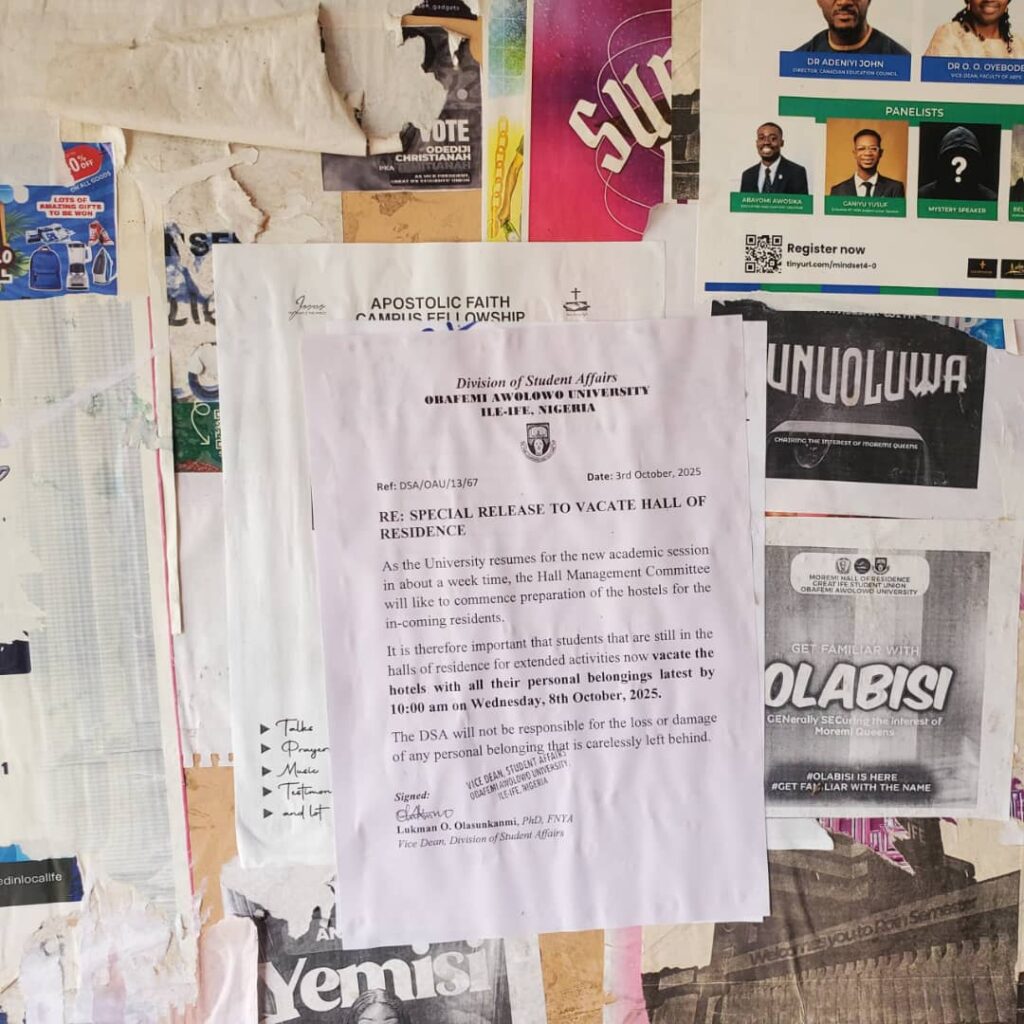The Division of Student Affairs (DSA) has issued a new directive instructing all students who remained in the halls of residence after the close of the last academic session to vacate their hostels with immediate effect. The notice, signed by Dr Lukman O. Olasunkanmi, Vice Dean of Student Affairs, and dated October 3, 2025, gave students a deadline of 10:00 a.m. on Wednesday, October 8, 2025, to pack up their belongings and leave. According to the management, the order was necessary to allow the Hall Management Committee to begin preparations for incoming residents in anticipation of the 2025/2026 academic session. The circular further warned that the DSA would not be held responsible for any personal belongings left behind after the stated deadline.
Ordinarily, such a directive might have been seen as routine housekeeping ahead of a new session. Still, this latest announcement has provoked renewed controversy because of the ₦8,000 fee that students were earlier asked to pay for an ‘extended stay‘ for anyone who wished to remain in the hostels after the last session ended for teaching practice (TP), Student Industrial Work Experience Programme (SIWEP), and similar activities.
Hairat Balogun, a part 4 student of Education and English Language, stayed behind because of her compulsory teaching practice at the Faculty of Education, an exercise that all education students must undertake before graduation. Having already completed the first round of teaching practice in her second year, she is currently observing the second round, which is a requirement in her fourth year. According to her, she paid the ₦8,000 fee in good faith, believing it would allow her to remain in her hall of residence throughout the six-week duration of her exercise. ‘I paid ₦8,000 because I am currently observing my teaching practice, which lasts for six to seven weeks. I’ve only stayed two weeks, and now the management is telling us to leave with just five days’ notice. What exactly did I pay for?’ she asked.
Hairat added that for an entire academic session, hostel accommodation costs ₦50,000, and she calculated that staying an additional seven weeks for ₦8,000, though expensive, was still better than seeking private accommodation. ‘How is it fair to charge ₦8,000 just for seven weeks after the session, only to send us away before the period even ends? This feels like outright injustice to students,’ she lamented, her tone reflecting both anger and helplessness.
Awe Precious, a part 2 student of Economics and an Institute of Chartered Accountants of Nigeria (ICAN) candidate who had remained in the hostel after the session to prepare for her examinations, explained that students in her category were initially informed that they would not be required to pay, but that promise was quickly broken when porters locked them out until they paid the ₦8,000. ‘At first, we were told those of us writing ICAN would not pay, but the porters locked us out until we paid ₦8,000. The money was too much for the value we got. The hostel needs renovation, and communication was poor,’ she explained.
Similarly, Adesanya Elizabeth, a part 3 student of the Institute of Education who stayed back for her practicum exercise, which was also situated on campus, expressed deep frustration at what she described as a breach of trust. ‘I decided to stay because my practicum placement was on campus, which made it easier. I paid ₦8,000 expecting to stay throughout the duration. But after not even two weeks, we’re told to leave. Now I have four weeks left, and I’ll have to start looking for where to keep my luggage,” she said. According to her, the arrangement was stressful from the very beginning, but what makes it worse is that she has not even enjoyed half the value of the payment before being told to move out.
Students argue that the ₦8,000 extended stay payment was presented as a straightforward deal: accommodation after the end of the session for anyone staying behind for Teaching Practice (TP), Student Industrial Work Experience Programme (SIWEP), and similar activities. However, in reality, many have received less than two weeks’ notice before being asked to leave.
The Students’ Union had earlier intervened when the ₦8,000 extended stay fee was first introduced, assuring students that it was monitoring the process to prevent exploitation. However, the latest directive raises questions about whether the Union was adequately consulted or even informed ahead of time. As of the time of filing this report, the Union has not released an official statement addressing the October 8 eviction order. The situation leaves behind a trail of unanswered questions: What exactly did the ₦8,000 cover? Why was the directive released just weeks into the period for which students had paid?

